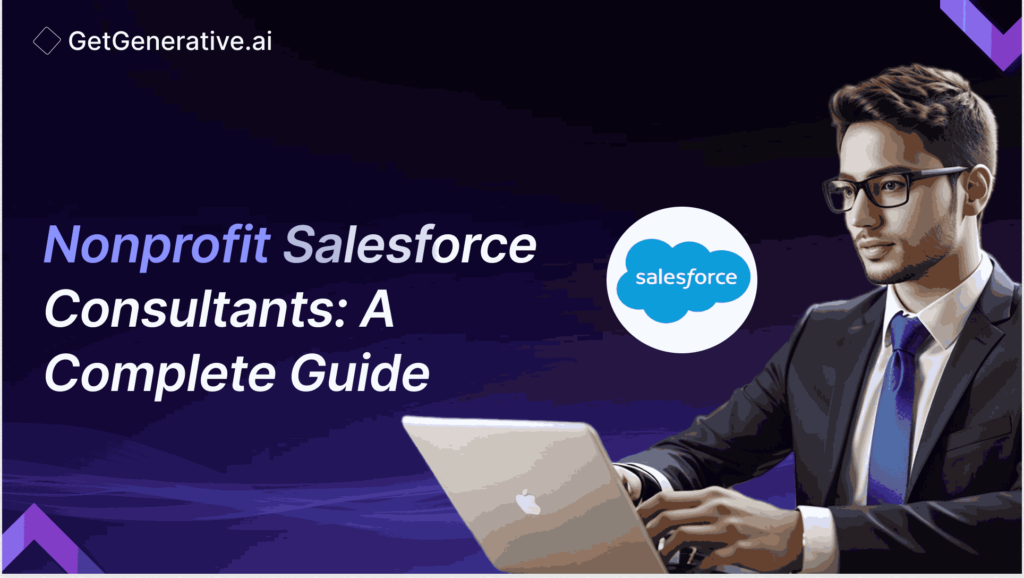Nonprofit Salesforce Consultants: A Complete Guide 2024
In the dynamic world of nonprofit organizations, managing donor relationships, volunteer coordination, and tracking programs is crucial. Salesforce offers tailored solutions to meet these needs. Nonprofit Salesforce consultants are pivotal in helping organizations leverage this powerful tool.
This blog explores the role of Salesforce consultants in the nonprofit sector, their services, best practices, and more.
What are Salesforce consultants for nonprofits?
Salesforce consultants for nonprofits are specialized professionals who assist organizations in implementing, customizing, and optimizing Salesforce solutions. They understand nonprofits’ unique challenges and tailor Salesforce to enhance operational efficiency, improve donor engagement, and drive mission success.
How do Salesforce consultants assist nonprofit organizations?
Salesforce consultants provide services that help nonprofit organizations optimize their operations and achieve their missions more effectively. Here’s a closer look at the specific ways they assist:
Implementation
- Needs Assessment: Consultants begin by conducting a thorough needs assessment to understand the unique requirements of the nonprofit. This includes evaluating current processes, challenges, and goals.
- Custom Setup: Based on the assessment, consultants configure Salesforce to align with the nonprofit’s specific workflows and objectives. This might involve setting up objects, fields, and workflows tailored to the organization’s needs.
- Data Structuring: They ensure that Salesforce’s data structure supports the nonprofit’s reporting and operational requirements, making it easier to track donations, manage volunteers, and measure program impact.
Customization
- Tailored Solutions: Consultants customize Salesforce features to better suit the nonprofit’s processes. This can include custom objects, fields, and page layouts that reflect the organization’s unique data and operational requirements.
- Automation: By creating automated workflows and processes, consultants help streamline repetitive tasks. For example, automating thank-you emails to donors, scheduling volunteer shifts, or tracking grant deadlines.
- App Integration: Consultants integrate Salesforce with other tools and applications the nonprofit uses, such as email marketing platforms, event management software, and accounting systems, to create a seamless operational ecosystem.
Also Read – Salesforce CPQ Consultant: A Complete Guide
Data Migration
- Data Cleaning and Preparation: Before migrating data from legacy systems to Salesforce, consultants clean and prepare the data to ensure accuracy and consistency. This involves removing duplicates, correcting errors, and standardizing formats.
- Migration Strategy: They develop a detailed migration strategy that minimizes downtime and ensures data integrity. This plan covers mapping old data fields to new ones in Salesforce and performing test migrations.
- Execution and Validation: Consultants execute the data migration and validate the results to ensure that all data has been accurately transferred and is functioning correctly within Salesforce.
Integration
- Third-Party Apps: Salesforce consultants help nonprofits integrate third-party applications to extend Salesforce’s functionality. This might include integrating email marketing tools like Mailchimp, payment processors like Stripe, or social media platforms.
- Custom APIs: For more complex needs, consultants can develop custom APIs that allow Salesforce to communicate with other software solutions the nonprofit uses, ensuring seamless data flow across platforms.
- Real-Time Syncing: Ensuring real-time data synchronization between Salesforce and other systems, consultants help maintain up-to-date information across all platforms, enhancing decision-making and reporting accuracy.
Training
- User Training: Consultants provide comprehensive training sessions for staff, ensuring they are comfortable and proficient in using Salesforce. Training can be tailored for different user roles, such as administrators, fundraisers, and program managers.
- Training Materials: They create and provide customized training materials, including user manuals, video tutorials, and FAQs, to support ongoing learning and reference.
- Ongoing Education: Consultants often offer ongoing training sessions and workshops to help staff stay updated on new Salesforce features and best practices.
Support
- Technical Support: Consultants provide technical support to address any issues that arise when using Salesforce. This includes troubleshooting, bug fixes, and performance optimizations.
- System Audits: Regular system audits are conducted to ensure that Salesforce is running efficiently and continues to meet the nonprofit’s evolving needs. This involves reviewing system performance, data integrity, and user satisfaction.
- Continuous Improvement: Consultants work with nonprofits to improve their Salesforce setup, suggesting and implementing enhancements based on user feedback and new organizational needs.
Salesforce consulting services for small nonprofits
Small nonprofits often have limited resources and distinct needs. Salesforce consultants offer services tailored to these organizations, such as:
- Affordable Implementation: Cost-effective setup solutions.
- Basic Customizations: Adjusting Salesforce for essential operations without unnecessary complexity.
- Scalable Solutions: Implementing a scalable setup that can grow with the organization.
- Grant Management: Simplifying the tracking and management of grants and donations.
- Volunteer Management: Streamlining volunteer tracking and coordination.
Also Read – Salesforce Data Cloud Consultant: The Role and Importance
Best CRM practices for nonprofits using Salesforce
To maximize the benefits of Salesforce, nonprofits should follow these best practices:
- Define Clear Objectives: Establish goals for what you want to achieve with Salesforce.
- Clean Data: Ensure data accuracy and consistency before migrating to Salesforce.
- Regular Training: Train staff to stay updated on new features and best practices.
- Leverage Reports and Dashboards: Use Salesforce’s reporting tools to gain insights and make data-driven decisions.
- Engage with the Community: Participate in Salesforce user groups and communities to share experiences and learn from others.
How much does it cost to hire a Salesforce consultant for a nonprofit?
The cost of hiring a Salesforce consultant for a nonprofit can vary widely based on several factors:
- Scope of Work: The complexity and extent of the project.
- Consultant’s Experience: More experienced consultants may charge higher rates.
- Location: Costs may vary based on geographic location.
- Ongoing Support: The need for continuous support and training can affect pricing.
On average, consulting fees can range from $100 to $250 per hour, with full projects costing from a few thousand to tens of thousands of dollars.
What are the best Salesforce products for nonprofits?
Salesforce offers several products tailored for nonprofits, including:
- Nonprofit Cloud: A comprehensive solution designed specifically for nonprofits.
- Salesforce.org Philanthropy Cloud: A platform for managing donations and volunteerism.
- Salesforce Pardot: For marketing automation and donor engagement.
- Einstein Analytics: Advanced analytics for deeper insights into data.
Is Salesforce a suitable CRM for all types of nonprofit organizations?
Salesforce is highly versatile and can be customized for various nonprofit organizations, from small local charities to large international NGOs. However, suitability depends on the organization’s specific needs and resources. Simpler CRM solutions might be more appropriate for some smaller nonprofits with very basic needs.
Related Read – Becoming a Salesforce Consultant – The Ultimate Guide
Do all Salesforce consultants provide training and ongoing support?
Not all Salesforce consultants offer training and ongoing support as part of their services. It’s essential to clarify the scope of services when hiring a consultant. Some consultants specialize only in implementation, while others provide comprehensive services, including training, support, and regular system audits.
Conclusion
Nonprofit Salesforce consultants are invaluable partners in helping organizations harness Salesforce’s full potential. They provide tailored solutions that enhance operational efficiency, improve donor and volunteer engagement, and support the nonprofit’s overall mission. By understanding their services, costs, and best practices for using Salesforce, nonprofits can make informed decisions and achieve greater impact.
Enhance your Salesforce consulting with GetGenerative.ai. Effortlessly craft outstanding proposals, enabling you to dedicate more time to providing exceptional client service.
Start today!
Frequently Asked Questions (FAQs)
1. What is a Salesforce consultant for nonprofits?
A professional who helps nonprofits implement, customize, and optimize Salesforce.
2. How can Salesforce consultants benefit my nonprofit?
They improve donor management, streamline operations, and provide training and support.
3. What are the costs associated with hiring a Salesforce consultant?
Costs vary based on the project scope, consultant experience, and the level of support needed.
4. Are there specific Salesforce products for nonprofits?
Yes, including Nonprofit Cloud, Philanthropy Cloud, Pardot, and Einstein Analytics.
5. Do all consultants provide ongoing support?
Not all; it’s crucial to discuss and clarify the services included with the consultant.




